Gone are the days when films were just meant for entertainment, and animated films, more so. Animation as an art form is a medium that gives us a glimpse of myriad worlds and things. Though animated films are mostly associated with fantasy, enchanted worlds, larger than life characters, something adorable, entertaining and happy endings, some of the directors and animators are using this medium to depict the stark and darker side of reality.
Quite a number of animation filmmakers in India have defied norms and sternly voiced about social causes and taboos, in terms of content and its treatment. These films are grim and disturbing as it holds a mirror in front of us. They make us think and attempts to take on these issues in order to uproot them from our society.
Few of such animated shorts that raises a strong voice about social issues are:
Muskaan (2017)
Muskaan is an attempt to eradicate the social biases in society against the girl child. Set in Himachal, this short film raises points relevant to the entire Indian context.
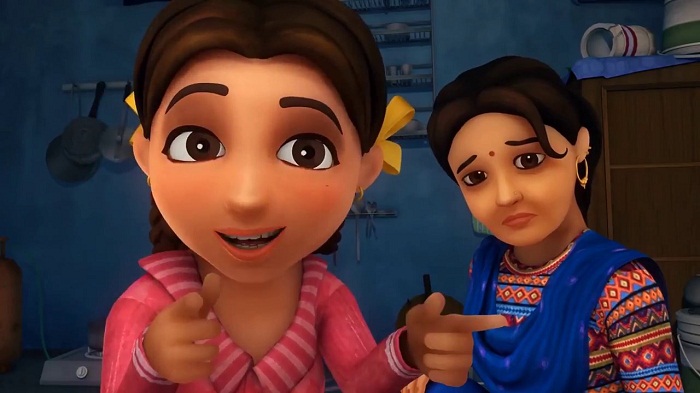
The film revolves around a young girl, Muskaan who accidentally happens to know that her pregnant mother is being forced by her grand mother to undergo a sex-determination test of her unborn child threatening that the fetus would be aborted if it turns out to be a girl. Muskaan takes up the challenge to change the mind of everyone in the family and to save them from committing such a horrific and inhumane act. While convincing her family members she breaks many gender biases and notions prevalent in the society that drive people to commit female foeticide.
An initiative by Directorate of Women and Child Development, Department of Social Justice and Empowerment, Himachal Pradesh, the film was created and developed by Girgit Studios. Speaking to AnimationXpress, Girgit Studios director and creative producer of the film, Swarup Deb mentioned, “In my opinion, a subject as sensitive as female foeticide is a tricky one to have a conversation about especially with children and the youth. Using animation, comforts the audience and helps them feel included. They don’t feel threatened by the seriousness of the subject. That is a good point to start a conversation towards finding solutions.”
Muskaan shattered boundaries of reality, conveyed complex ideas through simple visual metaphors and its animation proved out to be a very effective route. The film was uploaded on ‘Press Information Bureau’ got a great response even from the adult audience.
Chasni (2015)
Directed by animator and filmmaker, Abhishek Verma, Chasni deals with the prevalent heinous crime of acid attacks. There is a surge in frequency of acid attacks in India in recent times and these attacks result in painful disfigurement, which is apparently the prime motivation for this gruesome crime. It leads to immense physical and mental trauma in the victim as a consequence of stigma and loss of self-confidence.
“Chasni was inspired from the real event that happened in May 2013. Ms Preethi Rathi was attacked by her childhood neighbour at Bandra terminus. Mumbai Mirror reported a case of Late Preethi where they published her hand-written notes, she wrote in hospital. This made me to develop a film on disfigurement. If one gets away with your identity, what would happen to your existence? I was studying animation at IDC IIT Bombay and had a formal training in 2D animation and film-making. So, I choose to use the medium of animation to make this film,” Verma recalled.
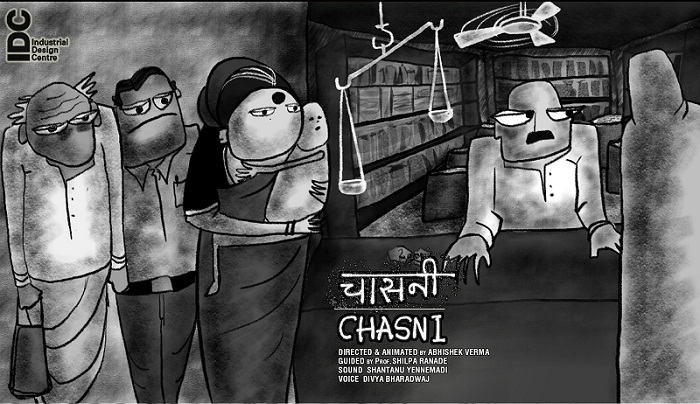
The short involved a lot research that was conducted in coordination with Laxmi Saa, an acid attack survivor in Delhi. Designed in grey scale and earthly tones, the subject space is dark and aptly emotes the the feeling that probably would have been marred if made in colour.
Elucidating on the title, ‘Chasni’, Verma added, “ I have seen how tea is an integral part of household routine for women. They manage large amount of time in domestic chores and tea is their favorite drink for recreation and rejuvenation. But suppose the tea box is empty and you can’t step out of your house to buy tea leaves. What would you do? Reaming possibility is sugar and water- Chasni- the sugar syrup. Here the ‘chasni’ is the drink of compromise.”
The presentation of disfigurement on screen is difficult and with a sensitive issue like acid-attack, more so. But Chasni does a commendable job in raising the voice against this inhuman crime.
Maacher Jhol (yet to release in public)
Another animated short directed by Verma, Maacher Jhol deals with homosexuality and its acceptance within a family. It is a difficult task, especially for parents as there are several societal prejudices related to homosexuality prevalent in India. A person who is homosexual is often scared and traumatised to divulge his sexuality because of an innate fear of stigma from society as well as a subsequent exclusion from one’s kith and kin. In this film, a young man, Lalit Ghosh (28) reveals his sexuality to his father while cooking his favourite food-fish curry (in bengali, ‘Maacher Jhol’).
“There is a big issue in the society for acceptance. I chose to address the same theme in this animation film. I wanted the film to be cultural and universal. So, I chose the dish because it’s my favourite (though I am not a Bengali). This is the most beautiful and delicious meal that satisfy anybody’s instinct (who eat fish) and it has fish. Here ‘fish’ acts as a connotation and provides more space for symbolism which is interesting to tell a story in more surreal manner,” he said.
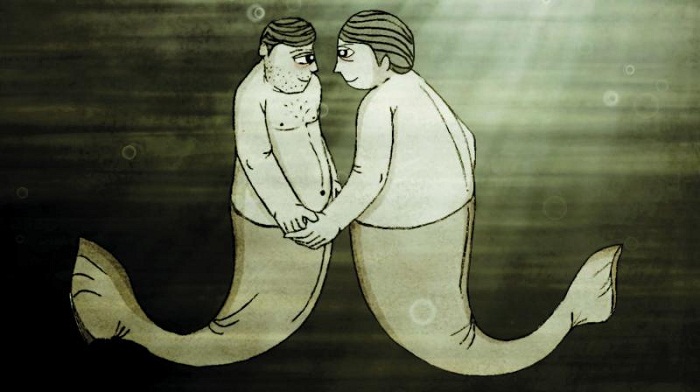
Adding more on the title, Verma noted, “ In the film the father carries it from Delhi to Chandigarh. So, we were looking at the dish which can survive for four hours in bus or train and our calculation said that ‘maacher jhol’ would be best. Apart it’s also a love story about two men. So, one was from Bengali family set up and Lalit’s boyfriend, Ashutosh from another community setup. Actually, it’s a mix setup of narrative presented through the metaphor of the curry.”
Co-written by Jayesh Bhosale, this animated short was influenced by Verma’s college friend who came out to him at the end of his college. The film is heavily research oriented and possibly such an issue hasn’t been discussed in animation so far. It was made in a strong cultural space which was provided by food as it’s the most integral part of the Indian routine space. The film makes a strong statement in the sphere of LGBT community demanding acceptance that it deserves.
Lukka Chuppi (yet to release in public)
The problem of open defecation and poor sanitation, especially for women is widespread in India. It directly affects the lives of women and girls in rural and suburban spaces. In the film, nine-year-old Bhuri faces embarrassment, eve-teasing and harassment as she is compelled to defecate in the open and tries to find a way to escape this ordeal. This story attempts to put forth the significance of toilets through the lived experience of little Bhuri.
Directed by Verma again, the film is inspired from the true incident that he witnessed while crossing Kalaji Mandir outer premise, New Delhi. Few small kids were defecating wearing a mask. An elder person came, hits the small kid, snatched the mask, wore it and sat for nature’s call. Lukka Chuppi was inspired from this incident.
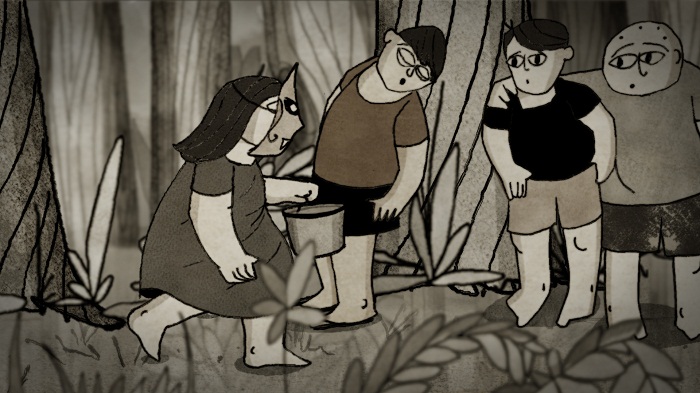
Throwing some light on the title Lukka Chuppi, Verma quoted, “Women and young girls goes for open defecation early mornings and late night only. When they go for the same, miscreants people (dressed as ghost/’bhoot’ )come who make them as their crime targets, teases them or comes and stand infant of them to make them feel shame. Especially the Bhoot in this case, is a human. In that case women has to shift from one position to other hiding and in parallel defecating. They literally have to play the game of hide and seek. Lukka-Chuppi comes from here.”
The film is an outcome of an extensive primary research on the ground and the entire survey was carried out by Latika Bhosale in few remote areas of Maharashtra that brought some shocking conditions to the forefront. With the trailer to be launched soon, the short seems to delve deep into the sorry condition of sanitation for women in this country with a heart-warming story and probably, a tragic ending.
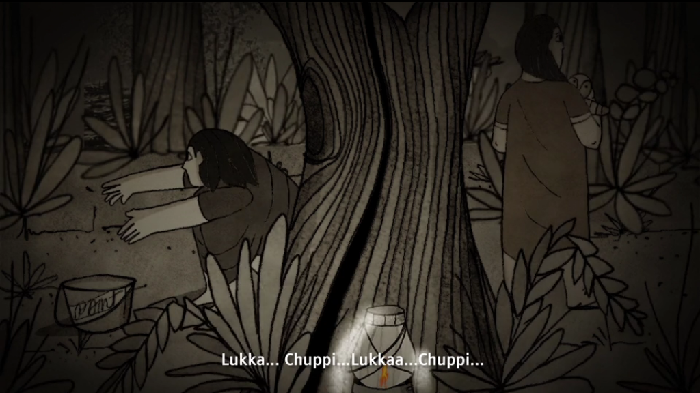
As Shyam Benegal once communicated to Verma, “It’s important to tell a story from your surrounding first,” these animated shorts have done their bit to make their voices heard about burning social issues and portray the incidents happening around us through animation.
